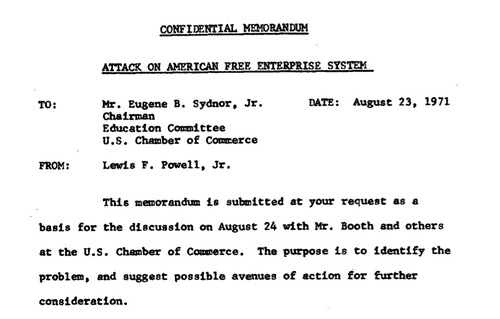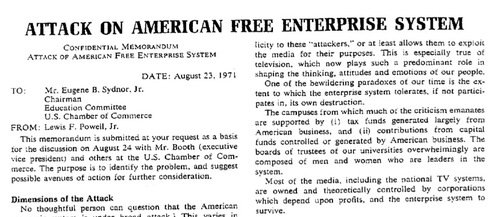September 25, 2011
EPISODE II: ATTACK OF AMERICAN FREE ENTERPRISE SYSTEM
There's an op-ed in the Washington Post today by Sally Kohn called "President Obama shouldn’t be afraid of a little class warfare." Here's some of what it says:
The class war began in 1971. That year, soon-to-be Supreme Court justice Lewis F. Powell Jr. wrote a confidential memorandum to a friend at the U.S. Chamber of Commerce about the "Attack of the American Free Enterprise System."
Oh man that makes me so happy. Of course, the title of the memo was actually "Attack on American Free Enterprise System," as you can see in this, which I believe is the original:

However, at some point it got reprinted somewhere—with both the correct title at the top, AND the greatest typo in world history in the subhead: "Attack OF American Free Enterprise System":

This must be the version that has circulated the most widely, because both PBS and Reclaim Democracy have the incorrect title in their transcribed versions. So that's fantastic already. But now with the wrong title in a Washington Post article, it may really go down in history (ie, Google) that way.
Also, this is interesting: just last month, the version of the Powell memo with the typo was hosted here on grassroots.com—the astroturf arm of Edelman, the largest private PR company on earth. Their clients include the Chamber of Commerce. So they're carrying out exactly the kind of Attack of American Free Enterprise that Lewis Powell wanted. I guess they still used it as a playbook.
However, as you can see by going to that link, it's now vanished from the Grassroots website. I wonder why?
—Jonathan Schwarz
September 21, 2011
Sonny Bono's Brother, Cui
By: John Caruso
When it comes to global warming denial, this has always been my favorite accusation:
Did you ever think that many of the scientists could be in error? I guess not. The falsifying of data probably didn't enter your little minds. Perhaps the data was changed to get more grants? Follow the money.
This is what it means to be a conservative*: you think it's obvious that 98% of climate scientists are falsifying data and/or supporting transparently bogus theories because they want to get their greedy little hands on some of that sweet, sweet grant money, while at the same time recognizing no financial incentive whatsoever on the part of oil company-funded "skeptics"—much less the oil companies themselves.
No really, work with me here: someone decides to spend ten years and tens of thousands of dollars earning a PhD, subjecting themselves to upper-level math/physics/statistics and classes with names like "Fluvial Geomorphology" and "Stochastic Hydrology", and finally manages to land a faculty position with a middling salary at some university somewhere. But you don't really think they care about any of that stuff, do you? Ha! No, it's just so they can risk their entire career and academic reputation by making shit up, in order to get their hands on some grant money they can then use to make even more shit up and get even more grant money, in a neverending cycle of dishonesty and megaprofit. Science, schmience; it's all about the stipends, baby! I mean sure, I suppose these same people could have just taken a community college course and gotten their real estate license, or maybe started a porn site or become an investment banker, but everyone knows the real money is in climate "science". Right?
(Just like everyone knows the best way to parlay your junk science into a massive payday is to set yourself in effective opposition to some of the most powerful and ruthless corporations on the planet, whose products also happen to be the foundation of modern society. Right? I mean, how else could you possibly profit from the calculated misuse of academic credentials?)
Head, meet ass; I think you two are going to be inseparable!
--
* (Or Alexander Cockburn)
— John Caruso
September 20, 2011
Back Complaining
I've been helping out on the launch of this, and that combined with some personal troubles has kept me so busy I haven't been able to use this space to complain about human existence. Fortunately things are less frantic, so I hope to be back complaining every day.
The personal troubles have had a happy ending, but I urge every single person in the U.S. to read The Life You Save by Patrick Malone about how to avoid preventable medical error when dealing with America's healthcare system. There is great care available if you push for it, but hospitals and the medical system generally are far more chaotic and dangerous than you would like to believe.
—Jonathan Schwarz
September 08, 2011
The Obama They Elected
By: John Caruso
As Israel was blanketing the Gaza Strip with high-powered explosives and white phosphorous in January of 2009, I wrote:
I have little doubt that Israel notified the Bush administration of their attack plans, but I'm equally confident they informed Obama's team. The Israelis want to have a good relationship with the incoming administration, and I can't believe they'd have blindsided them.
And sure enough:
One FBI post passed by Leibowitz to Silverstein indicated that the Israeli Embassy in the United States provided "regular written briefings" on Israel’s war with Hamas in Gaza intended for "President Obama in the weeks between his election and inauguration."
In the same posting I predicted the Israelis would provide Obama with a "January surprise" by terminating their attack before his inauguration day, which of course they did—and though it was apparent at the time that that was coordinated, the fact that we now know Obama was getting regular updates from the Israeli government puts it beyond a reasonable doubt. To put it another way: one of Obama's first acts as president—before he'd even been inaugurated—was to give the Israelis both approval and political cover to turn Gaza into a free-fire zone as long as they agreed to pull back from Guernica levels of mayhem to a less obtrusive Jack the Ripper style before his inauguration, thus sparing him the embarrassment of openly backing mass murder on his first day in office.
Figuring that out didn't require ESP any more than it does to guess what's going to happen when you throw an egg at the ground—just a willingness to ignore Obama's totally exciting yeswecanitudes and instead pay attention to tedious minutiae like his speeches to AIPAC, his articles in foreign policy journals, his pledges of undying loyalty to Israel on his campaign website, his Likudnik cabinet appointments, decades of lockstep US policy by both Democrats and Republicans, etc etc ad nauseum. Yawn. Nonetheless, Glenn Greenwald wrote at the time that "reliably predicting" whether or not Obama was going to continue the standard US policy of blind support for Israel "requires a clairvoyance which I believe people lack"—just one example of the misguided but depressingly universal wait-and-see attitude among Democratic-voting progressives after the election.
Why couldn't so many informed, intelligent and otherwise skeptical people "predict" something so obvious? Because they didn't want to, of course. Because seeing what was already so clear—among many other things, that Obama was a willing accomplice in Israel's orgy of killing and destruction in Gaza, with all that implied—would have harshed their pre-inaugural buzz by forcing them to accept the fact that they hadn't elected a champion of liberal values and human rights, but just another standard-issue imperial manager and corporate errand boy. The number of Obama voters who were even open to hearing the facts (much less accepting them) may have exceeded the world's unicorn population, but not by much.
They did Obama a real favor by giving him the benefit of the doubt in spite of the ample evidence that he didn't deserve it, since it made it just that much easier for him to do all the wonderful things he's done. And as much as I'd love to believe otherwise, I'm sure many of them will keep waiting to see the real Barack Obama—"the Obama we elected", as they often call him, as though their illusions still carry more weight than the unwelcome reality—right to the bitter end.
— John Caruso
September 03, 2011
Knock, Knock! Who's There? Iron!
By: Aaron Datesman
You can read an extraordinarily wide range of opinions about the dangers of plutonium - from "most toxic substance known to man" to "wouldn't harm you if you swallowed a tablet of it". I have found it to be quite difficult to come to an opinion on this issue by reading on my own. However, recently a small article flashed across my desk which clarified my thinking sharply. The topic itself is interesting, but I have another reason for bringing it up.
(I don't mean to write a review on the topic of plutonium toxicity. My own awareness of the issue began with this chapter of Killing Our Own about the Rocky Flats plutonium production facility in Colorado, which I encourage you to read. The EPA fact sheet is also not bad, at least as an indicator of the consensus opinion.)
The article is entitled Plutonium Tricks Cells by "Pretending" To Be Iron.
According to the researchers, from Argonne and Northwestern University, the plutonium acts like a "Trojan horse," duping a special membrane protein that is typically responsible for taking up iron.
An article from the June issue of Chemistry World titled "Mystery of how plutonium enters cells solved" (not freely available) includes this comment about the ANL/NU work:
That's maybe not so surprising, says Sarah Heath, a chemist at the University of Manchester, UK, who moved on to working with plutonium after first working with iron. She says that the two metals can often react in the same way.'The charge density of the two ions is very similar,' says Heath, and this means the ions behave similarly.
Iron, as a component of hemoglobin, of course is absolutely essential to the biological function of animal life. Therefore the idea that plutonium is biochemically similar to iron is rather alarming. This adds one item to a list of biological equivalents I first began to learn about after the Fukushima disaster in March: plutonium for iron, strontium for calcium (so that it accumulates in bone), and cesium for potassium (accumulating in muscle). There are other, less familiar, examples as well.
I learned nothing about this at the nuclear reactor summer camp in 1996 - in fact, I remember quite clearly being told that plutonium is not highly dangerous because the body has no mechanism for uptake. Now that I look, there is clear evidence that this should have been known to be false already in 1986 ("Influence of iron on plutonium absorption by the adult and neonatal rat").
On the other hand, it's fair to say that professors of nuclear engineering probably don't routinely read the journal "Toxicology and Applied Pharmacology". This strengthens quite a bit my opinion that perhaps nuclear engineers are not the experts we should be querying about the safety of nuclear technology.
This is immediately relevant since plutonium does appear to have escaped from the Fukushima site, but I bring it up for a more basic reason. Since we seem to be learning new things all the time, what business have we ever really had setting "safe" levels of exposure to plutonium? Judgments of safety are obviously estimates based (hopefully) upon the best information available at a certain point in time. (More significantly, in my opinion, those judgments are also based upon models - logical structures which themselves may contain unjustified or inapplicable assumptions.) But it might be that we just don't know enough about enough to justify making safety judgments at all.
Plutonium is a tricky material for a number of reasons. It has five allotropes, for one thing. (The allotropes of a material are identical in composition while being physically and chemically totally distinct. Graphite and diamond are both allotropes of carbon, for instance.) Another important problem is that the material is tightly controlled. Not that you would want to, but you can't just order 10 grams of plutonium from the chemical supplier and begin feeding it to rats to see what happens.
Therefore, it's possible that our knowledge of plutonium is rather constrained, relative to other radioisotopes whose biological action we would also like to have complete knowledge about. On the other hand, because it can be made to explode very, very well, and because the materials issues involved are so complex, over many decades the government has spent many billions of dollars, and employed many thousands of scientists, to work only on plutonium. I'm not sure how those two competing factors balance out.
So, now that this interesting quirk of plutonium biochemistry has been ironed out, maybe we know everything we need to know moving forward for the rest of time. We'll revise our estimates regarding safe levels of plutonium exposure, which in turn will bring the robustness of that judgment in line with similar estimates for radioactive iodine, cesium, and strontium, which are fully known to be correct. I find it impossible to believe this, but let's assume it.
Have we also done this for all of the one hundred major radionuclides which can be found inside a reactor system? Reproduced below is just the first page of Table A-1 from the document "Radiochemistry in Nuclear Power Reactors", published by the National Academies Press in 1996. (The table is two pages long.)

To have a high degree of knowledge about biological transport processes for every one of the 100 major radionuclides (to be fair, it's only 37 distinct elements) would be astonishing; I can't believe it would even be possible. It would be far easier to create estimates of health effects and safety by a) modeling living, densely interconnected systems as inanimate and unconnected, b) reducing the full array of possible chemical, biological, and radiological interactions down to a limited set of indicators (one number, if possible), and c) relating one discrete health outcome directly to that one number, while ignoring or discounting the possibility of other health effects.
Astonishingly enough, the easy road I've just described is what we've done. We call that one number the "dose".
How weird is that?
— Aaron Datesman
P.S. It hardly needs to be said, but the opinions expressed on this blog are my own alone, and scarcely reflect the opinions of my multiplicity of employers, including Argonne National Laboratory. Although I do have colleagues at the Advanced Photon Source at Argonne, I do not know the authors of the ANL/NU research



